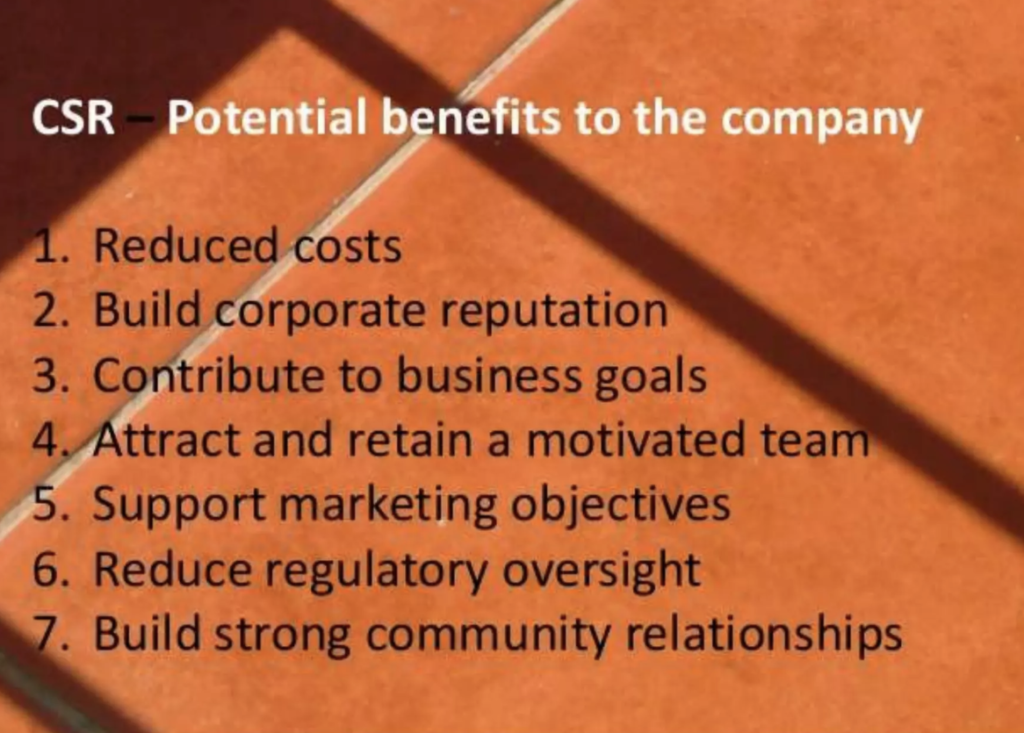Corporate Social Responsibility at Tesco in UK: Business Strategy, Success Factors, and Recommendations
- 26 November 2024
- Posted by: OAH
- Category: Business & Management

This post provides an in-depth analysis of Corporate Social Responsibility (CSR) at Tesco in the United Kingdom, focusing on its business strategy, success factors, and recommendations. It highlights Tesco’s commitment to sustainability, stakeholder engagement, and ethical practices. The report also highlights how CSR can be integrated into business operations to achieve long-term growth and business success. This sample is part of a management assignment help provided to one of our valued clients in London, UK. If you also need expert management assignment help, reach out to us today and secure top grades with high-quality assistance!
Need Management Assignments Assistance? Contact us!
THE IMPORTANCE OF MAINTAINING CSR IN TESCO
Table of Contents
Introduction – Benefits of CSR
- Improves both the reputation of the company and the loyalty of the customers
- Encourages the recruitment and continued employment of skilled workers
- Increases the quality of connections with various stakeholders
- Reduces environmental impact and fosters sustainable development
Speaker Notes: These days, CSR (Corporate Social Responsibility) is an essential part of every successful company’s strategy. It means accounting for how a company’s operations affect people and the planet. Keeping up Tesco’s corporate social responsibility is crucial for several reasons. As a result, sales and income are boosted. Second, it helps to recruit and keep the best and brightest people, who are increasingly seeking out jobs that have a good social effect. In the third place, a dedication to sustainability and ethical business practices enhances relationships with stakeholders including suppliers, investors, and regulators. Finally, CSR helps to lessen the negative effects of a company’s actions on the environment and promotes sustainable development, both of which are crucial to the company’s and the world’s long-term success.
Model of CSR
- The CSR framework highlights the significance of companies considering their social and environmental impacts throughout the course of several generations (Manuel and Herron, 2020.).
- Customers, workers, suppliers, and the public are all considered part of “stakeholders” in the CSR paradigm.
- Sustainable business practices are an integral part of corporate social responsibility.
- Lastly, corporate social responsibility necessitates openness and accountability in the form of social and environmental impact reporting.
Speaker Notes: Businesses that practice corporate social responsibility (CSR) make ethical and socially responsible choices in all aspects of their business. The CSR concept, as a whole, stresses the value of companies considering their broader social and environmental impacts. Building trust with their stakeholders and making a positive impact on the future is possible when businesses embrace sustainable practices, interact with those they affect, and advocate for openness and accountability.
Drivers on Tesco’s Corporate Social Responsibility
- Tesco’s CSR activities are driven in large part by the company’s dedication to sustainability.
- Tesco’s CSR initiatives are driven in large part by the company’s commitment to the satisfaction of its stakeholders (Kim et al. 2020).
- Tesco’s CSR initiatives are also influenced by the regulatory framework.
- Lastly, Tesco’s reputation is a major factor in the company’s commitment to CSR.
Speaker Notes: Tesco’s commitment to CSR is embedded across the company and is motivated by both internal and external forces. The organization is aware of its obligation to protect natural resources and advance environmentally friendly policies companywide. Tesco can better address the needs of its clientele, workers, vendors, and the community at large when it actively listens to and responds to their opinions. The corporation understands that it can improve its image and win back loyal customers by taking a more conscientious approach to how it does business. “Sustainability, stakeholder engagement, regulatory compliance, and reputation management” are only some of the external considerations that motivate Tesco’s corporate social responsibility activities.
Also Read How to Market a Sustainable Fashion Brand
Importance of CSR in Tesco
- Boosts credibility by inspiring trust across a wide range of interested parties.
- Boosts worker enthusiasm and dedication (Bhuiyan et al. 2022).
- Consequences on society and the environment are mitigated.
- Encourages ethical business practices and the preservation of the company’s future
Speaker Notes: Corporate social responsibility (CSR) is an increasingly important part of the modern business landscape, and Tesco is no exception. Tesco’s commitment to CSR is seen in a number of its policies and practices. For starters, it strengthens the company’s credibility with its consumers, partners, and financiers. Tesco can strengthen its reputation as an honest and dependable business by committing to CSR initiatives. Second, by fostering a pleasant workplace and offering chances for individual and collective development, CSR efforts may increase employee engagement and loyalty. Thirdly, CSR allows Tesco to lessen its influence on the environment and society by supporting sustainable sourcing practices and cutting down on waste.
CSR principles and strategies of Tesco
- Tesco’s corporate social responsibility (CSR) initiative is built on four pillars: “community, environment, marketplace, and workplace”.
- The company’s attempts to improve society and the environment are grounded on these tenets.
- Tesco is dedicated to fostering sustainable business practices and minimizing its environmental impact.
- The corporation has goals to decrease its carbon footprint, cut down on food waste, and enhance the environmental friendliness of its packaging (Barauskaite and Streimikiene, 2021).

Speaker Notes: Tesco has incorporated CSR, which stands for “Corporate Social Responsibility,” an integral part of its overall operating philosophy. The company recognizes the importance of giving back to the communities in which it operates and has implemented a variety of CSR strategies and ideas as a result. The firm has shown its dedication to giving back to the community in a variety of ways, including sponsorship of charitable events, participation in community service projects, and partnerships with local organizations. Because it gives food to people who are struggling to make ends meet, Tesco’s “Food Collection” program is one of the retailer’s most successful charitable efforts.
Customer service in CSR
- Distinctly demonstrates a commitment to catering to the requirements of its clientele for Tesco.
- Finds areas that might need some modification and unique ideas to improve the customer service of Tesco.
- Develops a customer base that is reliable and devoted to the brand
- Permits involvement from the community as well as assistance from those in it (Shah and Khan, 2020)
Speaker Notes: Tesco places a premium on providing excellent customer service as part of its CSR initiatives. Tesco’s activities are in line with the values of its stakeholders and the wider society because of the company’s commitment to corporate social responsibility (CSR), which promotes ethical businesspracticess and long-term sustainability. Tesco’s reputation as a trustworthy and long-lasting company depends heavily on its commitment to CSR. Tesco’s dedication to customer happiness is shown in its CSR initiatives, which prioritize listening to and resolving consumer complaints. This has the potential to boost the company’s image and win the confidence of its clientele.
Corporate Tax
- Tesco pays a fair share of tax in all countries where it operates and follows local tax laws (Derevianko 2019).
- The company communicates its tax policy and practices openly with stakeholders.
- Tesco uses internal controls and regular tax status reviews to decrease its tax obligation.
- The Extractive Industries Openness Initiative promotes tax openness and accountability.
Speaker Notes: Corporate social responsibility (CSR) is an integral part of Tesco’s business strategy. CSR is defined by Tesco as “initiatives to address social and environmental concerns.” Tesco’s CSR initiative relies heavily on the company’s corporate tax practices, such as its careful tax planning and public reporting (Chen et al. 2019). Tesco’s approach to corporation tax under its CSR program is reflective of the company’s commitment to moral business practices and its recognition of the value of giving back to the communities in which it operates.
Critical success factors of Tesco’s CSR
- The importance of sustainability to Tesco’s CSR program cannot be overstated.
- Tesco’s “Food Collection” program is only one example of the many successful community engagement efforts the company has launched (Nave and Ferreira, 2019).
- Tesco recognizes the importance of transparency and accountability in its CSR program.
- Tesco’s success may be attributed in large part to the company’s dedication to ethical business practices across its supply chain.
Speaker Notes: Tesco’s CSR initiatives, for which it has earned international acclaim, have had a significant impact on the company’s reputation and consumer loyalty. The company’s dedication to ambitious sustainability objectives and the broad adoption of sustainable practices across all facets of its business has allowed it to reduce its carbon footprint and push for responsible sourcing. The company has established a supply chain that places a premium on ethical sourcing, fair employment practices, and animal care to minimize risks to its reputation and legal compliance. Tesco’s commitment to sustainability, community participation, openness, and ethical business practices has been crucial to the success of the company’s CSR initiative. If Tesco prioritizes sustainability and social responsibility, it may continue to expand as a sustainable and socially responsible business.
Integration of CSR in strategic decision-making for Tesco
- Tesco’s corporate social responsibility (CSR) initiative is driven by the company’s stated mission of “Serving Britain’s shoppers a little better every day.”
- Tesco has lofty environmental ambitions that it has incorporated into its business strategy as a whole (Brin and Nehme, 2019).
- Tesco works with those affected by its decisions to better comprehend stakeholder issues and integrate their input.
- Tesco’s risk management procedures also take into account social and environmental threats and opportunities.
Speaker Notes: Tesco has made CSR a central element of its strategic decision-making because it understands the need to combine social and environmental concerns with commercial success. This objective represents the company’s commitment to satisfying its customers while limiting its impact on the world around it (Han and Lee, 2021). The first stage is talking to customers to find out what type of sustainable products they want, and the second is collaborating with suppliers to improve ethical sourcing methods. Overall, Tesco’s commitment to ethical and sustainable business practices is shown in the company’s adoption of CSR in strategic decision-making. If Tesco prioritizes social and environmental performance in addition to financial success, it can better serve its stakeholders and the broader benefit of society.
Also Read H&M vs Zara: Customer Journey Case Study

Tesco’s CSR’s Impact on the Company’s Corporate Strategy
- CSR has improved Tesco’s image and customer loyalty, boosting its bottom line.
- Eco-friendly measures and reducing Tesco’s environmental impact may boost profits.
- Corporate social responsibility (CSR) helps Tesco build good relationships with its many essential constituencies, which boosts its social license to operate (Siltaloppi et al. 2021).
- CSR helps Tesco manage social and environmental risks and seize opportunities.
Speaker Notes: Tesco’s long-term performance and competitive advantage may be directly attributed to the company’s commitment to corporate social responsibility (CSR). The overall financial success, social license to operate, and long-term sustainability of Tesco are all aided by the company’s commitment to CSR. Tesco can establish a successful and sustainable company that benefits its stakeholders and the broader community if it makes CSR a top priority and incorporates it into its corporate strategy. Tesco can improve operational efficiency and cut expenses, both of which will boost the company’s bottom line. Tesco’s social license to operate benefits from its commitment to corporate social responsibility (CSR), which helps the firm foster positive connections with its many important constituencies.
Recommendations
- CSR should remain central to Tesco’s business strategy, allowing the company to address social and environmental issues simultaneously.
- Tesco should establish lofty sustainability objectives and evaluate its performance against them often.
- Tesco has to keep talking to those who have an interest in the company, such as shoppers, workers, vendors, and residents (Avotra et al. 2021).
- Finally, Tesco should maintain open communication regarding its CSR results.
Speaker Notes: Taking into account social and environmental factors at all levels of the corporation, Tesco should maintain making CSR a core component of its business strategy. Tesco should set ambitious sustainability targets to minimize carbon emissions, and waste, and encourage responsible sourcing practices, and then regularly review its progress towards these goals. Tesco must maintain open communication with its stakeholders—customers, employees, suppliers, and the broader public—to address their concerns and act on their recommendations. Lastly, Tesco has to keep its CSR reporting transparent, informing its stakeholders of its progress towards sustainable targets and inviting their feedback throughout the process If Tesco continues to promote CSR and integrate it into its business model, it will be able to develop a sustainable and responsible corporation that benefits its stakeholders and the wider community.
Conclusion
- Tesco has made progress in reducing carbon emissions and promoting responsible sourcing.
- Tesco acknowledges the need to balance social and environmental well-being alongside commercial success, thus it has included CSR into its business strategy.
- Tesco addresses stakeholders’ concerns and incorporates their ideas into its strategy.
- Tesco prioritizes corporate social responsibility to build a socially responsible organization.
Speaker Notes: In sum, this analysis of Tesco’s CSR has shown how seriously the corporation takes issues of sustainability and corporate responsibility. CSR plays a significant role in Tesco’s overall brand and business strategy. Tesco can establish a successful and sustainable company that benefits its stakeholders and the broader community if it maintains its focus on sustainability and ethical business practices.
Reference List
Avotra, A.A.R.N., Chenyun, Y., Yongmin, W., Lijuan, Z. and Nawaz, A., 2021. Conceptualizing the state of the art of corporate social responsibility (CSR) in green construction and its nexus to sustainable development. Frontiers in Environmental Science, 9, p.541.
Barauskaite, G. and Streimikiene, D., 2021. Corporate social responsibility and financial performance of companies: The puzzle of concepts, definitions and assessment methods. Corporate Social Responsibility and Environmental Management, 28(1), pp.278-287.
Bhuiyan, M.A.H., Darda, M.A. and Hossain, M.B., 2022. Corporate social responsibility (CSR) practices in Islamic banks of Bangladesh. Social Responsibility Journal, 18(5), pp.968-983.
Brin, P.V. and Nehme, M.N., 2019. Corporate social responsibility: analysis of theories and models.
Chen, Z.F., Hong, C. and Occa, A., 2019. How different CSR dimensions impact organization-employee relationships: The moderating role of CSR-culture fit. Corporate Communications: An International Journal, 24(1), pp.63-78.
Derevianko, O., 2019. Reputation stability vs anti-crisis sustainability: under what circumstances will innovations, media activities, and CSR be in higher deman?. Oeconomia Copernicana, 10(3), pp.511-536.
Han, S.L. and Lee, J.W., 2021. Does corporate social responsibility matter even in the B2B market?: Effect of B2B CSR on customer trust. Industrial Marketing Management, 93, pp.115-123.
Kim, M., Yin, X. and Lee, G., 2020. The effect of CSR on corporate image, customer citizenship behaviors, and customers’ long-term relationship orientation. International Journal of Hospitality Management, 88, p.102520.
Manuel, T. and Herron, T.L., 2020. An ethical perspective of business CSR and the COVID-19 pandemic. Society and Business Review, 15(3), pp.235-253.
Nave, A. and Ferreira, J., 2019. Corporate social responsibility strategies: Past research and future challenges. Corporate Social Responsibility and Environmental Management, 26(4), pp.885-901.
Shah, S.S.A. and Khan, Z., 2020. Corporate social responsibility: a pathway to sustainable competitive advantage? International Journal of Bank Marketing, 38(1), pp.159-174.
Siltaloppi, J., Rajala, R. and Hietala, H., 2021. Integrating CSR with business strategy: a tension management perspective. Journal of Business Ethics, 174, pp.507-527.
Other Sample Works:
- SWOT and PESTLE Analysis of TESLA Company: Detailed and Informative
- Impact of Brand Awareness on Consumer Behavior
- The Impact of AI on Business Performance in India










